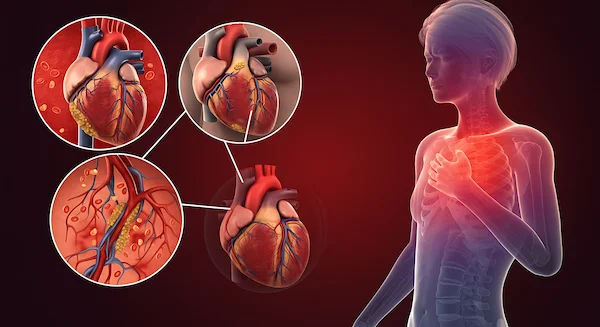Causes of Heart Blockage Explained
Explore the main causes of heart blockage, including plaque buildup, high cholesterol, and lifestyle factors. Learn how heart blockages develop and ways to prevent and manage them.

Written by Dr. Siri Nallapu
Reviewed by Dr. D Bhanu Prakash MBBS, AFIH, Advanced certificate in critical care medicine, Fellowship in critical care medicine
Last updated on 13th Jan, 2026

Heart blockage, also known as coronary artery disease (CAD), is a serious condition where the arteries supplying blood to the heart become narrowed or blocked. This happens due to the buildup of plaque, a mix of fat, cholesterol, and other substances inside the artery walls. Over time, this restricts blood flow, depriving the heart of oxygen and nutrients, which can lead to chest pain (angina), heart attacks, or other complications.
Understanding the causes of heart blockage is crucial because it helps in prevention and early intervention. Let’s explore the key factors that contribute to this condition and how you can protect your heart health.
Common Causes of Heart Blockage
Several factors can contribute to heart blockage, including underlying health conditions, lifestyle choices, and genetic factors. Here are the most common causes:
1. High Cholesterol Levels
One of the primary causes of heart blockage is high levels of LDL (bad cholesterol) in the blood. When LDL cholesterol builds up in the arteries, it forms plaque, narrowing the passage for blood flow. HDL (good cholesterol) helps remove excess cholesterol, so maintaining a healthy balance is essential.
What You Can Do:
Reduce intake of fried foods, processed snacks, and fatty meats.
Eat more fiber-rich foods like oats, fruits, and vegetables.
Exercise regularly to improve cholesterol levels.
2. High Blood Pressure (Hypertension)
Uncontrolled high blood pressure damages the inner lining of arteries, making them more prone to plaque buildup. Over time, this increases the risk of blockages.
What You Can Do:
Monitor blood pressure regularly.
Limit salt intake and avoid processed foods.
Stay active and manage stress through relaxation techniques.
3. Smoking and Tobacco Use
Smoking damages blood vessels, reduces oxygen in the blood, and accelerates plaque formation. Even secondhand smoke increases the risk of heart disease.
What You Can Do:
Quit smoking and seek help from support groups or doctors if needed.
Avoid exposure to secondhand smoke.
4. Diabetes and Insulin Resistance
High blood sugar levels in diabetes can damage blood vessels and increase cholesterol buildup. People with diabetes are at a higher risk of developing heart blockages.
What You Can Do:
Keep blood sugar levels under control with diet, exercise, and medication.
Get regular check-ups to monitor heart health.
5. Sedentary Lifestyle
Lack of physical activity weakens the heart and contributes to obesity, high cholesterol, and high blood pressure, all of which increase the risk of blockages.
What You Can Do:
Aim for at least 30 minutes of moderate exercise (walking, cycling, swimming) most days.
Avoid sitting for long periods and take short breaks to move around.
6. Unhealthy Diet
A diet high in trans fats, refined sugars, and processed foods leads to weight gain, high cholesterol, and inflammation all of which contribute to heart blockage.
What You Can Do:
Eat more whole grains, lean proteins, nuts, and fresh produce.
Avoid sugary drinks and excessive junk food.
7. Obesity and Excess Weight
Being overweight puts extra strain on the heart and increases the risk of diabetes, high blood pressure, and high cholesterol key contributors to heart blockage.
What You Can Do:
Maintain a healthy weight through balanced meals and exercise.
Consult a nutritionist if needed for a personalized diet plan.
8. Chronic Stress
Long-term stress raises blood pressure and may lead to unhealthy habits like overeating or smoking, increasing heart disease risk.
What You Can Do:
Practice relaxation techniques like deep breathing, yoga, or meditation.
Stay socially connected and seek support when needed.
9. Family History and Genetics
If close relatives have had heart disease, your risk may be higher due to genetic factors. While you can’t change genetics, you can manage other risk factors.
What You Can Do:
Get regular heart check-ups if you have a family history.
Adopt a heart-healthy lifestyle early on.
10. Age and Gender
The risk of heart blockage increases with age, especially after 45 for men and 55 for women. Men are generally at higher risk, but women’s risk rises after menopause.
What You Can Do:
Stay proactive with heart health screenings as you age.
Consult Top Heart Specialists
How to Prevent Heart Blockage?
While some risk factors (like age and genetics) can’t be changed, most causes of heart blockage can be managed with lifestyle adjustments:
Eat a Heart-Healthy Diet – Focus on fruits, vegetables, whole grains, and lean proteins.
Exercise Regularly – Aim for 150 minutes of moderate activity per week.
Quit Smoking – Seek professional help if needed.
Control Blood Pressure & Diabetes – Follow medical advice and monitor levels.
Maintain a Healthy Weight – Even small weight loss can improve heart health.
Manage Stress – Practice relaxation techniques and stay socially active.
Get Regular Check-ups – Early detection helps prevent complications.
When to See a Doctor?
If you experience symptoms like:
Chest pain or discomfort (angina)
Shortness of breath
Fatigue with minimal exertion
Dizziness or irregular heartbeat
It is important to consult a cardiologist. Early diagnosis and treatment can prevent serious complications.
Need a Heart Health Check-Up?
You can book a consultation or schedule tests like cholesterol screening, ECG, or angiogram through Apollo 24|7 for expert care from the comfort of your home.
Final Thoughts
Heart blockage is largely preventable with the right lifestyle choices. By understanding the causes and taking proactive steps, you can protect your heart and live a healthier, longer life. Small changes today can make a big difference tomorrow, start your heart-healthy journey now!
Consult Top Heart Specialists
Consult Top Heart Specialists

Dr. Birendra Pawar
Cardiologist
18 Years • MBBS, MD(Medicine), FIMSA, MIAE
Noida
Apollo Hospitals Sector 26, Noida
(50+ Patients)

Dr. Soumen Devidutta
Cardiologist and Electrophysiologist
11 Years • MBBS, MD, DM
Hyderabad
Apollo Hospitals Jubilee Hills, Hyderabad
(700+ Patients)

Dr Ahmed Sayeed
General Physician/ Internal Medicine Specialist
26 Years • MBBS, M.D (GENERAL MEDICINE), MRCP (UK)
Bengaluru
Apollo Clinic, JP nagar, Bengaluru
(25+ Patients)

Dr. Ramalinga Reddy
General Physician
5 Years • MBBS MD General medicine
Bengaluru
PRESTIGE SHANTHINIKETAN - SOCIETY CLINIC, Bengaluru

Dr. Swapnil Mate
Cardiologist
9 Years • MD (General Medicine), DM (Cardiology), Fellowship in Complex Coronary & Structural Interventions (Taiwan)
Pune
Apollo Clinic, Viman Nagar, Pune


